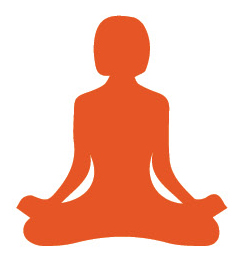Stressed? Exhausted? Stuck in a rut? Or just feeling a little ho-hum? When it’s time to nourish your soul, reach for these ideas…
1. Make this daily 10-minute date with yourself:
Meditate right after you awaken.
Related: I Actually Tried Meditation for 30 Days—This Is What Happened
2. Take a leisurely magnesium-replenishing bath.
Most of us are magnesium-deficient, especially when under stress, says herbal expert and consultant Lynda LeMole, former president and owner of Traditional Medicinals tea company. A magnesium deficiency can put a damper on energy capacity and let depression gain a toehold. Fortunately our skin absorbs magnesium from bathwater containing Epsom salts, aka magnesium sulfate.
LeMole suggests adding lavender to the bath and enjoying candlelight during your soak. “Our skin is our largest organ of absorption and elimination, so in hot water we discharge the negative and open to the healing, relaxing lavender,” she explains. LeMole adds that absorbing magnesium through soaks and taking oral magnesium supplements “can go a long way in relaxing our fried and exhausted nerves.”

Or consider a warming mustard bath. Fans of British novels may be aware of these restorative baths, a traditional English remedy for reducing stress and aches as well as ridding the body of toxins, says Cleveland Clinic psychologist Susan Albers, Psy.D., New York Times best-selling author of Eat Q. Her recipe: In a bowl, mix ¼ cup mustard seed powder, ¼ cup Epsom salts, ¼ cup baking soda and 10 drops of your favorite essential oil. Pour in a hot bath and soak.
For a further boost after your bath, massage magnesium oil into the skin.
 3. Heed the mind-body-spirit connection.
3. Heed the mind-body-spirit connection.
“When my spirit is ailing, usually my body is also,” says LeMole, who tunes up her body a bit with more healthful eating and more movement. “My emotions, mind and spirit greatly improve.” Experts say foods that help calm anxious jitters include nuts, seeds and dark leafy greens, which are rich in magnesium. Sardines, salmon and walnuts provide omega-3 fatty acids; an omega-3 deficiency can contribute to fatigue, mood swings and depression.
4. Serve somebody.
Seattle Seahawks quarterback Russell Wilson visits hospitalized children in intensive care and cancer units every week—and goes home inspired. “Sunday is game day for me, but my best day is Tuesday when I visit Seattle Children’s [Hospital],” he says in a hospital blog post. “All the amazing opportunities I’ve had on the field can’t compare.… All these kids are so brave and to be there for them and give them a boost is really important to me. What they don’t know is how much they affect me: I get an even bigger boost from them!”
“Spending a few minutes each day truly relaxed and enjoying yourself is certainly good for your mental health.”
 5. Lose yourself by reading.
5. Lose yourself by reading.
Former President Jimmy Carter and his wife, Rosalynn, take turns reading the Bible aloud before bed. Cathy Goodwin, a career-change coach, favors mysteries. “I’m a big believer in escape and knowing your personal escape routes. Give me a good mystery, and I’m in another zone. That really does refresh my soul,” says Goodwin, who likes strong heroines such as Julia Spencer-Fleming’s series about female priest Clare Fergusson. If you enjoy novels but can’t find time to read, commit to reading for 15 minutes, suggests Karina Davidson, professor of behavioral medicine at Columbia University Medical Center. (She led a study that found happy people are less likely to develop heart disease.) “Spending a few minutes each day truly relaxed and enjoying yourself is certainly good for your mental health and may improve your physical health as well,” Davidson adds.
6. Forgive someone.
Talk about lifting a burden off your shoulders: Recent research found that study participants who forgave were later able to jump higher, on average, than participants who didn’t forgive. “When people forgive someone, the ‘weight being lifted off their shoulders’ is a metaphor that can activate a real concept of lightness,” says University of Washington assistant professor of management Ryan Fehr. He extrapolates that “forgiveness might help people retain more energy, carry less stress and even perform better at work.”
7. Play with a pooch or cuddle a kitten.
Patting a furry friend has been shown to reduce blood pressure and stress hormones. Laura T. Coffey, author of My Old Dog: Rescued Pets with Remarkable Second Acts, believes that older dogs optimize the benefit. “Senior dogs tend to be calm, mellow, sweet and lovable, and they’re so happy to be with you. This, of course, is good for the soul—and the ego. Time spent with an older dog is divine!”

 8. Smile!
8. Smile!
The mere act of putting a smile on your face influences your feelings, studies suggest.
9. Breathe the clean air of nature.
Jim Whittaker endured hurricane-force winds and swirling snow to become, in 1963, the first American to summit Mount Everest. In wild places, “I enter my own personal cathedral and know where I fit in the vastness of creation,” he shares in his memoir, A Life on the Edge. Whittaker adds that throughout his life, the beauty and richness of nature has served as “my inspiration, my comfort, my compass and rudder.”
Hike the Grand Canyon, LeMole recommends. Dive in Belize. Climb Half Dome in Yosemite National Park. “My spirit refreshes itself when I get more nature, and sometimes the bigger the better,” she says. “Why? Big doses of Big Nature feed my soul with the basic elements of life on planet Earth: more oxygen, the green of chlorophyll, the microbes in rich soil, the long-view perspectives and panoramas that put us in our size and place, and then the gratitude that comes from experiencing such natural joy.”
Even five minutes in nature helps boost mental health and mood, a British study found, so go walk, garden, cycle or the like. “A walk a day should help keep the doctor away,” says Jo Barton, Ph.D., a lecturer in sports and exercise science at the University of Essex.
 10. Scope out new scenery.
10. Scope out new scenery.
For example, check out a new ethnic grocery store, visit a museum in another town or book tickets to a city you’ve never visited. “Nothing inspires us more or opens up our eyes than traveling somewhere new,” Albers says. “A new scene stimulates your senses and wakes you up out of your autopilot actions that make you feel like a walking zombie.”
 11. Try the inspired self dialogues journaling technique.
11. Try the inspired self dialogues journaling technique.
Tama Kieves of Denver, career transition coach and author of Inspired & Unstoppable: Wildly Succeeding in Your Life’s Work! says she teaches clients this practice and uses it herself: “I write out my fears and uncertainties. Then I write back to myself from the point of view of my inspired self, a voice that is the most loving I can imagine, perhaps saying what I would tell my best friend or child, someone I passionately believed in. I answer the fear from this place. I often dialogue back and forth between the voices until I feel peace of mind. This technique helps bring me from a place of anxious disconnection to feeling safe, centered and clear about my greatest potential.”
12. Spend a day with a young child.
They will see (and share) wonder in everything.

13. Lunch in the light.
Head outdoors or to an atrium at noon, advises Heather McAuliffe, author of Beating Seattle’s Grey. She measured the intensity of light indoors and outdoors in Seattle for a year—with surprising findings. Indoors, light intensity was a mood-killing 300 to 400 lux. Even in the cloudy outdoors, however, there was as much mood-lifting light intensity (10,000 lux) as offered by a light therapy box used by some people to combat seasonal affective disorder. “People need to be aware that adequate light exposure is a daily bodily need,” McAuliffe says, “and that they have to deliberately take action to get enough light since homes and indoor workplaces often do not offer sufficient light.”
 14. Immerse yourself in music you love.
14. Immerse yourself in music you love.
The second movement of Beethoven’s violin concerto “is my soul nourishment right now,” says Maria Goodavage, author of the New York Times best-seller Soldier Dogs. The San Francisco resident has temporarily stopped seeing friends and blocked out other distractions because of a tight deadline on another book, so listening to the music “has been giving me great comfort and happiness and peace. There’s something so calming, ethereal and yet grounding about the larghetto [music with a languid tempo]. It’s like a slow, reassuring heartbeat. The true soul-nurturing to me is in the pauses, which I know sounds strange. Maybe it’s because I can’t take time to pause with this deadline.”
15. Regularly do good deeds while expecting nothing in return.
Research backs up the happy punch this will bring you: When students were told to perform five acts of kindness a week over six weeks, their well-being increased compared to a control group, according to a study overseen by University of California, Riverside psychology professor Sonja Lyubomirsky, author of The How of Happiness. In that study, the biggest increase was seen by those who performed the five acts in one day instead of spread over time. A study elsewhere found that empathy toward strangers triggers a release of oxytocin and subsequent generosity.
 16. Indulge in artwork.
16. Indulge in artwork.
Visit a local museum or online collections at MoMA.org or UGallery.com. “Art is when you hear a knocking from your soul—and you answer,” as quotation anthologist Terri Guillemets put it. A study at University College London looked at what happens to the brain when one looks at beautiful paintings and found that “works of art can give as much joy as being head over heels in love,” according to The Telegraph.
17. Ponder a poem.
Or write one. “I tell my workshop students, ‘I want you to think of yourselves as artists. Then when you’re writing, you’re painting, you’re crafting, you’re making a design, you’re sculpting, you’re creating choreography, sound, a sound script. You’re composing a choir on the page,’ ” U.S. poet laureate Juan Felipe Herrera told the Los Angeles Times.
18. Move to music.
“It’s a great way to spread positive energy throughout my body and get excess, not-so-positive energy out,” says Talia Pollock, a New York City health and wellness coach. She runs with abandon “to songs that speak to my soul and make me feel like I’m on top of the world, totally capable of anything.”
 19. Clean/de-clutter.
19. Clean/de-clutter.
Clutter can be a reminder of things that need to be done, spurring a feeling of failure, says Elaine Aron, Ph.D., author of The Highly Sensitive Person. Cheer yourself quickly by straightening a few surfaces. “Just the illusion of order is enough to ease the mind,” she’s quoted as saying on Prevention.com.
20. Change the environment of hurrying the kids to school into a meditation.
“I love listening to the upbeat and soothing yoga-chanting music of Girish, Krishna Das, Wah!, Snatam Kaur or Jaya Lakshmi in the mornings as I make the kids breakfast and get them off to school. While the music is playing, it changes the environment of rushing to school into a meditation,” says mother of two Zhena Muzyka, founder of Zhena’s Gypsy Tea.
21. Feel the spray of a waterfall or crashing surf.
The negative air ions boost mood, some studies have found.

22. Inhale an aroma you love for 30 seconds.
Ideally from a plant, but straight from a bottle of essential oil will do. The scent you choose isn’t so important; the principle is that we breathe deeper when we like a certain smell, and the mere act of breathing deeply makes us slow down our fast, shallow breaths, says Mindy Green, a Colorado-based herbalist, author and clinical aromatherapist. Dab essential oil—citrus, eucalyptus, peppermint, lavender or whatever scent you fancy—on a handkerchief and keep it in your wallet or purse for easy access in a flash.
 23. Imagine your life as a pie.
23. Imagine your life as a pie.
Pick a flavor that describes you and write two sentences that explain why, advises work-life wellness expert Samantha Ettus, who views the pie as the best way to think about a balanced life. Next steps: 1. Divide your life into six or seven slices: Career, Health, Relationship, Kids (if you have them), Community, Friends, Hobbies. 2. For each slice, make concrete achievable goals such as “set a weekly date night with my spouse” for the relationship slice or “contact three new people every week to expand my network” for the career slice. 3. Start evaluating your success not on how you spent your time or with guilt over what you should be doing, but on what you’ve achieved. “Voilà!” Ettus says. “Now you have a healthier and happier way to look at your life and make progress.”
 24. Go fish.
24. Go fish.
“Fly fishing can nourish every part of us; our eyes feast on the beauty of the water, our nose and lungs take in the pure air, our ears hear the sounds of rushing water, and our hands gracefully send the fly onto the stream,” New Jersey-based Rabbi Eric Eisenkramer writes in his blog “The Fly Fishing Rabbi.”
25. An elevating elixir.
When she needs comfort from chilly weather “or when I feel empty or discouraged,” Lynda LeMole, former president of Traditional Medicinals tea company, reaches for a nighttime cup of Golden Turmeric Milk. Every ingredient has nourishing restorative medicinal properties, says LeMole, now a consultant to herbal businesses. Here’s her recipe.
Turmeric Golden Milk Recipe*
- 12-ounce can of coconut milk (full fat or light)
- 1½ cups oat milk (or almond milk or cow’s milk)
- 1 teaspoon powdered turmeric
- ½-inch piece or more of fresh turmeric peeled, chopped
- 1 teaspoon powdered cinnamon
- 1 cinnamon stick, sliced or broken thin
- 1 half-inch piece of fresh ginger root, peeled and chopped, and/or 1 teaspoon ginger powder
- A few peppercorns, crushed
- Pinch of cayenne pepper
- A few cardamom seeds (opened; use the inner seeds) and/or ½ teaspoon cardamom powder
Directions: Prep, chop ingredients. Put all ingredients into a small saucepan and simmer covered for 10-15 minutes. Strain about ¾ cup of mixture into each cup.
(Note: If you don’t have fresh ginger, fresh turmeric, cardamom seeds, cinnamon sticks, use powdered. It will still be good. Also: Spices may be reboiled a few times with new milk and a smaller amount of fresh spices added.)
To each cup add:
- ¼ to ½ teaspoon raw honey
- ½ teaspoon ghee
- ½ teaspoon coconut oil
- A few drops of vanilla extract
Stir, whisk or froth with a small immersion blender or whisk or fork. Drink immediately while still warm.
*Use organic ingredients if possible, LeMole advises.
26. Practice gratitude.
Make it a daily habit to jot down five things you’re grateful for.
 27. Strengthen body and soul through yoga.
27. Strengthen body and soul through yoga.
“Silverback yoga” is the tongue-in-cheek name of the class geared to older clients taught occasionally by Kerry Wilson, who also is a lawyer-turned-developer in Winter Haven, Florida. He considers yoga superior to all other exercise because it boosts mood, relieves pain, clears the mind and is meditative.
28. Drop the perfectionist, all-or-nothing attitude.
This is one of the biggest obstacles to people taking time to nourish the soul, says psychologist Elizabeth Lombardo, Chicago-area author of Better Than Perfect: 7 Steps to Crush Your Inner Critic and Create a Life You Love. Can’t go to a 90-minute yoga class? Try one yoga pose during the course of the day. Can’t sit for 30 minutes of meditation? Try five deep breaths. “Personally, I love to go for a walk outside. The combination of exercise, nature and no distractions allows me to really nourish my soul. Ideally, I take an hour or longer,” Lombardo says, “but sometimes I don’t have the time. So I take a walk around the block.”
29. Get a massage.
Studies indicate that massage melts away stress and combats pain.
If you “stay connected to your soul and remain happy, you will find that your heart is filled with positive feelings.”
 30. Lose yourself by watching live theater.
30. Lose yourself by watching live theater.
“Life beats down and crushes the soul, and art reminds you that you have one,” as the late actress and acting teacher Stella Adler told her students. A study found greater empathy and tolerance in Arkansas students six weeks after they saw high-quality productions of Hamlet or A Christmas Carol, as compared to students in control groups.
31. Live fully in the present.
Notice the chirping bird, the squirrel scampering across the grass, the sound of the breeze rustling the tree leaves. “When you aren’t distracted by your own negative thinking, when you don’t allow yourself to get lost in moments that are gone or yet to come, you are left with this moment. This moment—now—truly is the only moment you have. It is beautiful and special,” Sydney Banks asserts in the chapter he contributed to Handbook for the Soul. Banks also says that if you stay present “and stay connected to your soul and remain happy, you will find that your heart is filled with positive feelings.”
32. Gaze at the stars, maybe through a telescope.
“When I look at the universe, I feel large, because I remind myself that not only are we living in this universe, the universe is living within us,” astrophysicist Neil deGrasse Tyson said in a lecture. And ponder this point from Tyson: “There are more stars in the universe than grains of sand on any beach, more stars than seconds have passed since Earth formed, more stars than words and sounds ever uttered by all the humans who ever lived.”

33. Keep dreaming.
Fight the good fight in the name of your dreams. “Dreams provide nourishment for the soul just as a meal does for the body. Many times in our lives we see our dreams shattered and our desires frustrated, but we have to continue dreaming. If we don’t, our soul dies,” says Paulo Coelho, best-selling author of The Alchemist. Lack of time is the first symptom of the process of killing our dreams, Coelho’s guide told him during a pilgrimage. The busiest people find time to do everything, while “those who do nothing are always tired and pay no attention to the little amount of work they are required to do. They complain constantly that the day is too short. The truth is, they are afraid to fight the good fight.”
Related: 13 Ways to Take Care of Yourself Every Day
This article originally appeared in the June 2016 issue of SUCCESS magazine.









